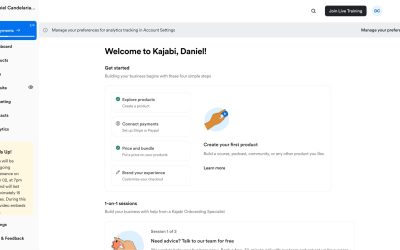How to Name a Private Practice
Going through the process to name your therapy private practice can be a stressful endeavor, and is often one that delays people from moving onto the next steps in building a practice.
First, you have to relieve some of the pressure that you feel to come up with the “perfect” business name—one that you imagine you’ll be married to for the rest of your career.
It’s not like that. There is no perfect business name!
You just need a private practice name that’s good enough.
There are a few different approaches you can take to naming a private practice, and part of your decision will rely on answering some preliminary questions:
- Will you ever hire someone else on to your practice?
- Do you think you’ll ever move or expand your practice?
- How much time, energy, or money are you willing to put into SEO?
- Would there ever be a situation in which you’d want to sell your practice?
Should you use your personal name?
If you think there’s any remote chance that you’d want to hire someone to join your practice eventually, that helps narrow your business name down a great deal because it means you won’t be using your name. I made this mistake in growing my first practice in San Francisco: John Clarke Therapy.
I was so excited that www.johnclarketherapy.com was available!
I’d never seen my name in a URL, and I imagined growing this amazing brand where people would recognize my name all over town, would read the best selling books I planned to write, and would hire me for all their keynote speeches.
But what other therapist would want to work for “John Clarke Therapy”? And what if I eventually wanted to sell the private practice, or even sell just the website?
My prospects for growing this business to include anyone beyond myself were really slim.
I realized this after I had spent 2 years growing the website, hiring SEO consultants, and blogging my tail off.
As you can imagine, I didn’t want to start all over again.
For these reasons, I always recommend against using your personal name when naming your therapy private practice.
Using local or regional keywords to name your private practice:
If I knew when growing my first practice that I’d for sure stay in SF forever (which I didn’t), then it might have made sense to include a regional keyword in my business name. Probably something using words like “San Francisco,” “SF,” “Bay Area,” “SF Bay Area,” etc.
Choosing a name with “Bay Area” or “SF Bay Area” would have been safer than “San Francisco” or just “SF,” because they could still logically allow me to open other offices in other parts of the Bay Area, rather than being limited to San Francisco.
On the other hand, using a keyword that would be TOO specific wouldn’t be ideal either. For instance, my office was in the Noe Valley area of San Francisco, and someone had already named their practice “Noe Valley Therapy” and claimed the associated domain name.
This might be great for the purposes of SEO and people finding you more easily on Google, but what happens when your office building gets sold and you have to move to the adjacent Bernal Heights neighborhood?
All of a sudden your business name doesn’t make sense, is confusing, and all the work you did to rank higher on Google for that particular neighborhood is down the drain.
Remember when I asked you how much you’d be able to invest in doing things to build your SEO?
When I moved from San Francisco to Charlotte, I knew I’d have a ton of other things to take care of during this transition, and I wanted to use my new practice name as kick start to ranking higher on Google. I also wanted a name that was descriptive in itself—that didn’t necessarily need a tagline or a mission statement beside it every time you see the business name.
Charlotte Counseling & Wellness contains two critical keywords that helped me grow fast: “Charlotte” and “counseling”.
I knew that “therapy” is searched more often than “counseling,” but couldn’t find anything with the words “Charlotte” and “therapy” in a domain name that I liked.
I think “wellness” is a nice word that further conveys the result of what we do in my practice, so I included that word in the business name.
It also serves as an additional keyword if people are searching things like “Charlotte wellness centers,” etc.
Let me say that is it not completely necessary to include a regional keyword in your business name/URL. It may give you a boost, but your main priority should be on choosing a name and URL that truly fits your vision and brand, and will attract the right kind of clients.
Again, I also chose not to include my personal name in naming my new practice because not only would no one want to be hired at John Clarke Therapy, but they also wouldn’t want to purchase a business named John Clarke Therapy if I ended up moving again or eventually wanting to retire, etc. So this part of my decision making process was intuitive.
Fortunately, this helped majorly when I decided to sell my group counseling practice in April 2019.
Conveying your brand in your private practice name:
What are some existing therapy practice names that you like? Do some Google searching for counseling in your area and take some notes.
Which names are you most drawn to?
Are any of them self-descriptive, or are they more abstract?
Which ones are confusing, and don’t “read” as a therapy practice?
How would other people describe you, and the kind of clinical work that you do?
A lot of people choose to base their private practice name off of their vision or branding ideas—things like “Compassionate Therapy,” “Artistic Healing Counseling,” “New Leaf Counseling,” etc. Doing this is fine, but you’re not going to get that kick start in terms of SEO.
You’re going to have to do more work, actually, to tell Google that you’re a therapy/counseling practice in Phoenix, AZ, etc. This isn’t too difficult, but it takes a little time and you’ll probably want to get some help from a good SEO person.
You may also need to rely more heavily on things like blogging to show Google that your site is relevant and thriving. If you’re really attached to a certain non-regional keyword (like “healing, renew, discovery, compassion,” etc.), you can definitely make this work with some diligence and a little help.
The benefit to a name like this is also that if you ever move, you could take it with you. It could also be argued that a name like this lends itself better to creating a memorable brand and feel, whereas names like “San Diego Counseling Center” have a generic and forgettable feel to them.
Finally, if you only serve one particular population, you could consider some combination of what I’ve described her, like “Charlotte Teen Therapy,” or “Compassionate Couples Therapy,” etc.
Check to see if the URL for your private practice name idea is available:
It is critical that your URL exactly matches your business name, whenever possible. Also, a .com is strongly encouraged.
Whatever name you choose, make a firm decision and commit to it! Don’t get held up by trying to think of the “perfect” business name.
Once you’ve chosen and secured your URL domain with BlueHost, your next step is to register and file for a Limited Liability Company (LLC) with LegalZoom. This process is super quick, easy, and ensures that your personal assets are never liable to any legal risk that ever comes your way.
Eventually, no matter what, you’ll grow into it and it’ll feel like you. Even a name you feel mediocre about can be really enhanced with some excellent logo and web design where your brand can be conveyed through colors, texts, and copy. Good luck naming your private practice!
John Clarke, MA, EdS, NCC, LPC is a licensed psychotherapist and a private practice expert. He has built thriving practices from the ground up in San Francisco, CA and Charlotte, NC. In building his current practice, he had 6 private-pay clients booked for the first day that his doors were open.
Learn more about how we can help at www.privatepracticeworkshop.com/workwithme




